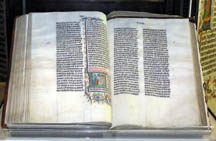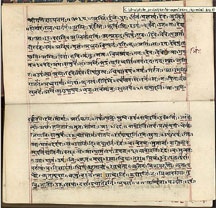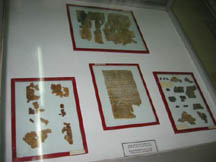
A Bible handwritten in Latin in 1407, on display at the Malmesbury Abbey, Wiltshire, England
| This is a work in progress: lots of writing, formatting, revising, proofing left to do! — David McMurrey |

If you know that this book contains a chapter on overly long sentences, you may be wondering what necessitates this chapter. Sentences with overly long introductions or overly long interruptions can indeed be overly long in general—but not necessarily. Sentences can have overly long introductions or overly long interruptions but otherwise be a reasonable number of words in total length.
That's the focus of this chapter: a certain unfortunate writing style that either churns out too many words before the main clause or that jams in too many words that interrupt the core grammar of the sentence. The result is poor comprehension and readability.
When too many words come before the main clause, readers seem to get distracted and lose their concentration. Something in their mental reading machinery must be saying, "When will we ever get to the point of this?" Or maybe it's like having to hold your breath too long: you can't come up for air until you get to the main point. Here are some examples:
Overly long introduction? Because scientists have discovered that many stars are accompanied by planets and because they have detected organic material in the circumstellar disks from which planets are created, they believe that there are many more potential sites for life than previously thought.
This 27-word introduction may not seem like such a monster despite its length. It's secret for success is the repetition of because. If you think that this longish introduction places an undue strain on readers, you would make the introduction its own separate sentence and add a transition element to the other sentence:
Revision:
Scientists have discovered that many stars are accompanied by planets, and they have detected organic material in the circumstellar disks from which planets are created. Therefore, they believe that there are many more potential sites for life than previously thought.
or
Scientists believe that there are many more potential sites for life than previously thought because they have discovered that many stars are accompanied by planets and because they have detected organic material in the circumstellar disks from which planets are created.
or
Two developments have led scientists to believe that there are many more potential sites for life than previously thought: first is the discovery that many stars are accompanied by planets; second is the detection of organic material in the circumstellar disks from which planets are created.

Which of the three revisions do you like? The first is a bit flatfooted and undramatic. The second is matter of fact and undramatic as well. The third has a nice suspense-building lead-in (just what are those developments?) and uses the strong transitions first and second. How about this next one?
If you are confident you can fix sentences with long introductions, try your hand at this exercise:
When lengthy interruptions occur between the core grammatical elements of a sentence, readers have comprehension problems. Consider the core grammar of a sentence the subject, verb, direct object or subject complement.
Subject + transitive verb + direct object:
In 1901, Marconi transmitted the first transatlantic radio signal.
Subject + intransitive verb:
Nikola Tesla listened earnestly for signals from Mars and Venus.
Subject + linking verb + subject complement:
A popular option for communication with ETIs is low frequency radio waves.
Interruptions can occur probably in any area of a sentence, but interruptions—both good and bad—between these core elements are the most common. Here are some examples of reasonably brief interruptions that would not cause comprehension problems:
Brief interruptions:
Developments during this century have expanded the scope of the observable universe.
Prospects of an encounter with extraterrestrial intelligence have been primarily linked with developments in radprismnet.communication.
Techniques which led to the growth of radio astronomy were developed after the Second World War.
In 1978, the launch of NASA’s Einstein satellite, carrying an X-ray telescope, initiated the era of X-ray astronomy, providing fresh information about quasars, neutron stars and black holes.
In 1902, Lord Kelvin, the British physicist, announced his belief that New York, because it was so well lit, was the best place for Martians to observe and make contact.

However, interruptions that go beyond the number of words you see in the preceding examples can give readers some real headaches. Here are some brain-injuring examples:
Overly long interruption: Nevertheless, SETI, operating at a level comparable to the context of discovery in scientific research where rules are more loosely applied and where the short-term objective is the plausibility of its hypotheses not their certitude, is deeply committed to current scientific standards.
As you can see, 34 words create quite an interruption between the subject and the verb of the main clause. The core grammar of the sentence is Nevertheless, SETI is deeply committed to current scientific standards. Usually, fixing long interruptions is simple: you just create two sentences and be mindful of the transition:
Revision: SETI operates at a level comparable to the context of discovery in scientific research where rules are more loosely applied and where the short-term objective is the plausibility of its hypotheses not their certitude. Nevertheless, SETI is deeply committed to current scientific standards.
Why Nevertheless? The author is making the point that scientific research expects more rigorous standards of SETI research than it does of its own research work. How about this next one?
Overly long interruption: The suggestion in August 1996 by NASA (National Aeronautical and Space Administration) scientists that life could independently appear on two planets within the same stellar system generated considerable speculation regarding the possibility of extraterrestrial intelligence.
Here, this 24-word interruption comes between the subject suggestion and its verb generated. Once again, the easiest solution—assuming you think the interruption is too long—is to make two sentences:
Revision: In August 1996 by NASA (National Aeronautical and Space Administration) scientists suggested that life could independently appear on two planets within the same stellar system. This suggestion generated considerable speculation regarding the possibility of extraterrestrial intelligence.

There are other ways to revise of course. You could start with When NASA scientists claimed... or end with such a clause. In nearly all of these revisions, notice how some word in the newly created sentence is echoed in the following sentence. Here, suggested in sentence 1 is echoed as suggestion in sentence 2. This is good repetition: it keeps readers on track and mentally organized.
If you are confident you can fix sentences with long interruptions, try your hand at this exercise:
It's the theory of this book that creating sentences with style problems is a healthy thing. If you can intentionally create sentence-style problems, you can recognize and revise that type of problem all the better. And, in creating these sentence-style problems—however perverse—you are building stronger verbal muscles. Creating overly long introductions and interruptions, as you do here, is like power lifting in some crazy word fitness center.
Original: Millions of people worldwide read the New Testament——whether from curiosity or religious devotion. However, very few ask what this collection of books actually is or where it came from, how it came into existence, who decided which books to include, on what grounds, and when.
Turn the first sentence into an overly long introduction to the second sentence. (Actually, the result may not be all that long for some readers.) Actually, if you reverse the two main parts of the sentence and then combine them, you've got a painfully long introduction.
Version with long introduction:
Even though millions of people worldwide read the New Testament—whether from curiosity or religious devotion—very few ask what this collection of books actually is or where it came from, how it came into existence, who decided which books to include, on what grounds, and when.
or
Even though very few people ask what this collection of books we know as the New Testament actually is or where it came from, how it came into existence, who decided which books to include, on what grounds, and when, millions of people worldwide read the New Testament——whether from curiosity or religious devotion.
Original: The New Testament did not emerge as an established and complete set of books immediately after the death of Jesus. Many years passed before Christians agreed concerning which books should comprise their sacred scriptures, with debates over the contour of the “canon” (the collection of sacred texts) that were long, hard, and sometimes harsh.
Okay, let's wreck these two pretty sentences. Use the second sentence as the unbearably long introduction to the first sentence (hint: use because).
Version with long introduction: Because many years passed before Christians agreed concerning which books should comprise their sacred scriptures, with debates over the contour of the "canon" (the collection of sacred texts) that were long, hard, and sometimes harsh, the New Testament did not emerge as an established and complete set of books immediately after the death of Jesus.

Original: Other books were available for inclusion in the Bible. These were written by Christians who claimed to be the original apostles of Jesus but who advocated points of view quite different from those later embodied in the Bible.
Use the second sentence to create a long interruption.
Version with long interruption: Other books, also written by Christians who claimed to be the original apostles of Jesus but who advocated points of view quite different from those later embodied in the Bible, were available for inclusion in the Bible.
Original: The New Testament itself is the collection of books that emerged from the conflict, the group of books advocated by the side of the disputes that eventually established itself as dominant and that handed the books down to posterity as “the” Christian Scriptures.
What an opportunity for a long interruption!
Version with long interruption: The New Testament itself, the group of books advocated by the side of the disputes that eventually established itself as dominant and that handed the books down to posterity as "the" Christian Scriptures, is the collection of books that emerged from the conflict.
Original: This group was itself internally quite diverse, but it agreed on major issues of the faith, including the existence of one God, the creator of all, who was the Father of Jesus Christ, who was both divine and human, who along with the Father and the Holy Spirit together made up the divine godhead.
This one can easily go both ways: you can create a long introduction or a long interruption.
Version with long introduction: Agreeing on major issues of the faith, including the existence of one God, the creator of all, who was the Father of Jesus Christ, who was both divine and human, who along with the Father and the Holy Spirit together made up the divine godhead, this group was actually quite diverse internally.
Version with long interruption: This group, agreeing on major issues of the faith, including the existence of one God, the creator of all, who was the Father of Jesus Christ, who was both divine and human, who along with the Father and the Holy Spirit together made up the divine godhead, was itself internally quite diverse.
A neat trick for handling long introductions is to punctuate it with an em dash (the big long one) and use a summary word after th dash:
Technique for long introductions: Agreeing on major issues of the faith, including the existence of one God, the creator of all, who was the Father of Jesus Christ, who was both divine and human, who along with the Father and the Holy Spirit together made up the divine godhead——these issues were decided by a group that was actually quite diverse internally.
Original: The first instance that we have of any Christian author urging that our current twenty-seven books, and only these twenty-seven, should be accepted as Scripture occurred in the year 367 CE, in a letter written by the powerful bishop of Alexandria (Egypt), Athanasius.

You already have a rather long interruption. Make it longer by adding the phrase in a letter... to it.
Version with long interruption: The first instance that we have of any Christian author urging that our current twenty-seven books, and only these twenty-seven, should be accepted as Scripture, specifically, in a letter written by the powerful bishop of Alexandria (Egypt), Athanasius, occurred in the year 367 CE.
Original: These texts are referred to as the early Christian "Apocrypha," another problematic term in that it technically refers to "hidden books" (the literal meaning of "apocrypha"), hidden either because they contained secret revelations or because they simply were not meant for general consumption.
This one is tough. Try starting out with a because clause. Use that nice long appositive phrase beginning with another problematic to start the sentence.
Version with long introduction: Because the term "apocrypha" used to refer to the early Christian Apocrypha technically refers to "hidden books" (the literal meaning of "apocrypha"), hidden either because they contained secret revelations or because they simply were not meant for general consumption, this designation of the texts is problematic.
Original: A number of these books, however, do not fit that designation because they were written for general audiences. Still, as long as everyone agrees that in the present context the term “early Christian apocrypha” designate books that were sometimes thought to be scripture but which were nonetheless finally excluded from the canon, then the term can still serve a useful function.
What a challenge! See if you can convert the first sentence into another introductory dependent clause and add it to the second sentence.
Version with long introduction: Although a number of these books do not fit that designation because they were written for general audiences, as long as everyone agrees that in the present context the term "early Christian apocrypha" designate books that were sometimes thought to be scripture but which were nonetheless finally excluded from the canon, then the term can still serve a useful function.
Original: Jewish Christians in the early centuries of the church are widely thought to have preferred the Gospel of Matthew to all others, because it is Matthew that stresses the importance of keeping the Jewish Law down to the smallest detail and that emphasizes, more than any other, the Jewishness of Jesus.

Get ready for some verbal acrobatics. Convert this sentence to passive, then jam a big interruption in just after the subject.
Version with long interruption: The Gospel of Matthew, because it is Matthew that stresses the importance of keeping the Jewish Law down to the smallest detail and that emphasizes, more than any other, the Jewishness of Jesus, was preferred by Jewish Christians in the early centuries of the church to all others.
Original: Matthew, the “Gospel of the Nazareans,” eventually fell into disfavor with the Christian community at large, both because few Christians in later centuries could read Aramaic and because the Gospel’s Jewish emphases were considered suspicious.
This one is just asking to be interrupted! The big dependent clause at the end of the sentence can easily be moved in between the subject (and the appositive following it) and the verb.
Version with long interruption: Matthew, the "Gospel of the Nazareans," both because few Christians in later centuries could read Aramaic and because the Gospel's Jewish emphases were considered suspicious, eventually fell into disfavor with the Christian community at large.
If you are confident you can actually create long introductions and long interruptions within sentences, try your hand at this exercise:
Links to these exercises are provided at the end of the sections where they are relevant. But here they all are in case you read the text straight through:

Return to the table of contents
Information and programs provided by admin@mcmassociates.io.